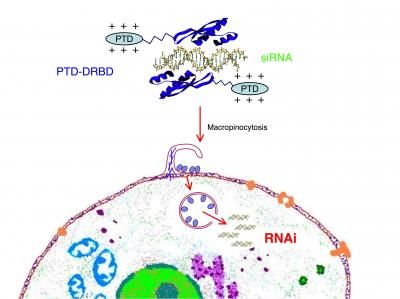All genes in 1 go
Advertisement
The majority of rare diseases are hereditary. But despite significant progress in genome research, in most cases their exact cause remains unclear. The discovery of the underlying genetic defect is, however, a prerequisite for their definitive diagnosis and the development of innovative approaches to their treatment. Scientists at the Max Planck Institute for Molecular Genetics and the Institute of Medical Genetics at the Charité Universitätsmedizin - Berlin have succeeded in using a new process with which all of the genes in the human genome can be analysed simultaneously. The process was used for the first time on three children in a family who suffer from a rare form of mental retardation (Mabry Syndrome). The analysis revealed a mutation in the PIGV gene that results in the inability of proteins, for example alkaline phosphatase, to anchor to the surface of cell membranes. The results reveal that the new genome sequencing processes are suitable for tracking down individual mutations in the genome and for the identification of these mutations as the cause of rare diseases.
The Berlin-based researchers used high throughput sequencing technology for the first time to identify the genetic defect behind a very rare disease. "It was like the proverbial search for a needle in a haystack. We fished out solely the 22,000 genes from the entire genome, decoded their sequence and examined them for mutations. Using new bioinformatic analyses, we were able to limit the number of mutation candidates to two – one of which is ultimately responsible for Mabry Syndrome," explains Michal Ruth Schweiger from the Max Planck Institute for Molecular Genetics. The available results will enable, for example, the identification of the genetic risk in affected couples who would like to have children.
Mabry Syndrome is a rare recessive genetic disorder that causes mental retardation, seizures and a characteristic mutation in the blood values of those affected. The raised level of the enzyme alkaline phosphatase, which usually plays a role in bone metabolism, can be measured in the blood. The researchers succeeded in showing that in the case of Mabry Syndrome the PIGV gene is mutated. PIGV codes, in turn, for an enzyme that is involved in the formation of the GPI anchor. This carbohydrate molecule binds proteins to the cell membrane. According to the scientists in Berlin, the gene for PIGV is mutated in such a way that the alkaline phosphatase is not adequately connected to the cell membrane. It separates from the membrane, accumulates in the blood, and thereby leads to an increase in blood levels. The researchers assume that PIGV in the brain is responsible for the anchoring of many other proteins and that this malfunction is responsible for the mental retardation associated with Mabry Syndrome.
Based on these results, the scientists will be able to carry out further research on the disease and develop new options for its treatment. The methods of genome analysis developed here enable the identification of mutations even in the case of extremely rare diseases and represent an important step forward in the direction of individualised molecular medicine.
Original publication: Peter M. Krawitz, Michal R. Schweiger, Christian Rödelsperger, Carlo Marcelis, Uwe Kölsch, Christian Meisel, Friederike Stephani, Taroh Kinoshita, Yoshiko Murakami, Sebastian Bauer, Melanie Isau, Axel Fischer, Andreas Dahl, Martin Kerick, Jochen Hecht, Sebastian Köhler, Marten Jäger, Johannes Grünhagen, Birgit Jonske de Condor, Sandra Doelken, Han G. Brunner, Peter Meinecke, Eberhard Passarge, Miles D. Thompson, David E. Cole, Denise Horn, Tony Roscioli, Stefan Mundlos & Peter N. Robinson ; "Identity-by-Descent Filtering of Exome Sequence Data identifies PIGV mutations in Hyperphosphatasia Mental Retardation syndrome (HPMR)"; Nature Genetics 2010.

























































